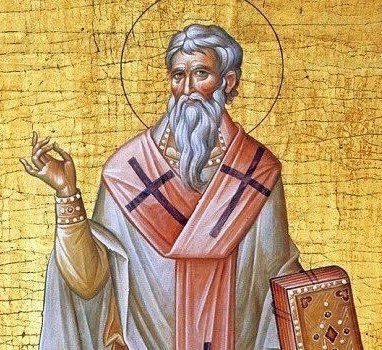St. Irenaeus of Lyons
Born in Smyrna (modern-day Turkey) around the year 135AD, St. Irenaeus of Lyons was raised in a Christian family. As a young man, he was a student of St. Polycarp, the bishop of Smyrna, who himself was a disciple of St. John the Apostle. He was deeply inspired by Polycarp’s preaching and stories, all of which were first-hand accounts received from the Apostle John. Eventually, Irenaeus made his way to the region of Gaul in modern-day France where he became a priest in the city of Lyons. In 177AD, he was sent to Rome with a message for Pope Eleutherius. During his time away, the Roman Emperor Marcus Aurelius began a persecution of Catholics in Lyons leading to the death of many Christians including the 90 year-old bishop of Lyons. Upon his return home, Irenaeus was named the new bishop and immediately began re-building the persecuted community by his personal holiness, zealous preaching, brilliant theological mind and selfless charity. He wrote several books. One of his most important works is entitled Against Heresies (Adversus Haereses). This book is vital to Western history on numerous accounts. It represents one of the first works of theology which seeks to present a cohesive and unified vision of Christianity and its teachings. This would become a model of religious thought for many centuries to come. Yet, the most important contribution of St. Irenaeus is his defense of the inherent goodness of the created world. At this time, there were a group of heretics called the Gnostics who asserted that matter, meaning all of created being, was evil. In particular, the human body was highly detested as something to be despised and rejected. St. Irenaeus combated this gross teaching by a single brilliant phrase which continues to be a reference point for anthropology: “The glory of God is man fully alive!” In contradiction to the Gnostics, Irenaeus upheld the inherent dignity of the human person by referencing humanity to divinity. God’s greatest glory is when we as human persons live our lives to their fullest potential, body and soul. With these words, the bishop of Lyons is preserving the value of creation. This would be crucial to the future of Western civilization especially in regards to the natural sciences and medicine. It was the Catholic Church’s teaching on the dignity of the world and the human person which led to the blossoming of research in ways to protect and preserve them. If the world is beautiful, then that means it is worth understanding and exploring. If humanity is good, than that means every human being is worth respecting and saving. In the end, St. Irenaeus helped protect the West from becoming a civilization that was anti-human and hedonistic. If only we could re-learn some of his lessons today…


